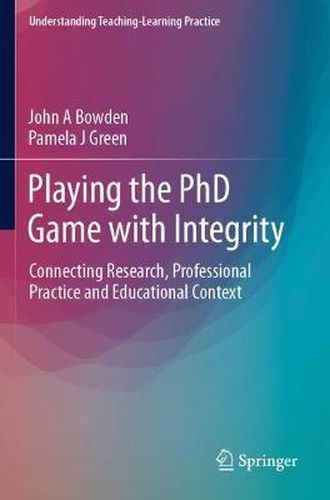Readings Newsletter
Become a Readings Member to make your shopping experience even easier.
Sign in or sign up for free!
You’re not far away from qualifying for FREE standard shipping within Australia
You’ve qualified for FREE standard shipping within Australia
The cart is loading…






This title is printed to order. This book may have been self-published. If so, we cannot guarantee the quality of the content. In the main most books will have gone through the editing process however some may not. We therefore suggest that you be aware of this before ordering this book. If in doubt check either the author or publisher’s details as we are unable to accept any returns unless they are faulty. Please contact us if you have any questions.
This book focuses on integrity throughout the PhD journey and beyond, and is organised around two main themes: (1) integrity in relation to the capabilities developed by doctoral candidates for professional practice; and (2) integrity and coherence at the PhD system level. The working methods of key participants such as PhD candidates, supervisors, university managers, government agencies and politicians are central to achieving integrity goals within PhD programmes. In this context, a number of constructs are developed that inform the practice-based elements of the book in relation to conducting doctoral research, research supervision, academic writing, and research training support systems; in particular, these include our Moral Compass Framework for professional integrity, notions of collective morality, decision-making when faced with ‘wicked’ problems, connected moral capability and our double-helix model of capability development, negotiated sense in contrast with common sense, completion mindsets and contexts, mindfulness, liminality, and mutual catalysis in joint authorship. While the data the book employs stems from practice-led research within the Australian doctoral system, the conclusions drawn are of global relevance. Throughout the book, wherever appropriate, comparisons are made between the Australian context and other contexts, such as the doctoral systems of the United Kingdom, Europe and the United States.
$9.00 standard shipping within Australia
FREE standard shipping within Australia for orders over $100.00
Express & International shipping calculated at checkout
This title is printed to order. This book may have been self-published. If so, we cannot guarantee the quality of the content. In the main most books will have gone through the editing process however some may not. We therefore suggest that you be aware of this before ordering this book. If in doubt check either the author or publisher’s details as we are unable to accept any returns unless they are faulty. Please contact us if you have any questions.
This book focuses on integrity throughout the PhD journey and beyond, and is organised around two main themes: (1) integrity in relation to the capabilities developed by doctoral candidates for professional practice; and (2) integrity and coherence at the PhD system level. The working methods of key participants such as PhD candidates, supervisors, university managers, government agencies and politicians are central to achieving integrity goals within PhD programmes. In this context, a number of constructs are developed that inform the practice-based elements of the book in relation to conducting doctoral research, research supervision, academic writing, and research training support systems; in particular, these include our Moral Compass Framework for professional integrity, notions of collective morality, decision-making when faced with ‘wicked’ problems, connected moral capability and our double-helix model of capability development, negotiated sense in contrast with common sense, completion mindsets and contexts, mindfulness, liminality, and mutual catalysis in joint authorship. While the data the book employs stems from practice-led research within the Australian doctoral system, the conclusions drawn are of global relevance. Throughout the book, wherever appropriate, comparisons are made between the Australian context and other contexts, such as the doctoral systems of the United Kingdom, Europe and the United States.